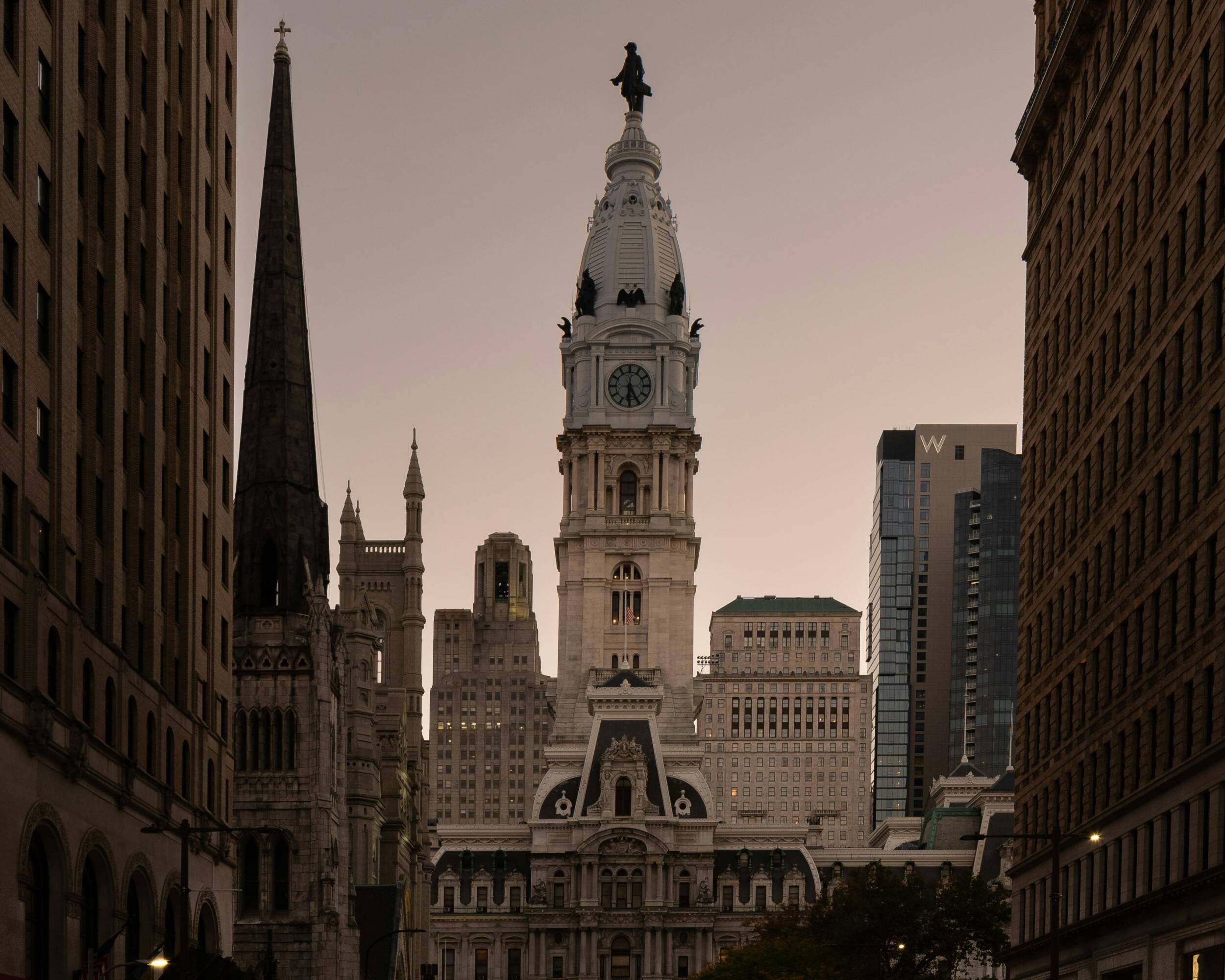
Written by Eric Miller – 2/29/2024
Clean and Green: Assessing New Philadelphia Mayor Cherelle Parker’s Climate Goals
Mayor Parker’s Plan
On January 2nd, 2024, Philadelphia swore into office its 100th Mayor, Cherelle Parker, who has pledged to make Philadelphia the “cleanest, greenest big city in the nation”. Parker is Philadelphia’s first female Mayor and ran a campaign mostly focused on expanding community safety initiatives, increasing funding for education, and “cleaning and greening”. While Parker was not seen by most energy and sustainability advocates as the “climate candidate” in the 2023 Democratic Mayoral Primary Election, Parker has a history of supporting sustainability initiatives and has indicated support of her predecessor Jim Kenney’s actions to work towards a carbon neutral Philadelphia. It would be premature to evaluate Mayor Parker’s climate and sustainability record just shy of two months into her first Mayoral term, so let’s begin with an assessment of her 100 Day action plan and the goals she set out as a candidate.
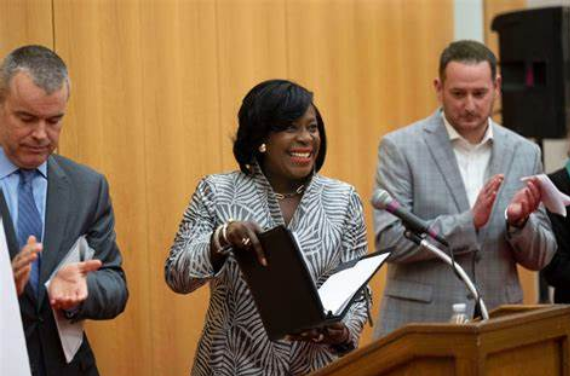
(msn.com)
Parker’s 100-day action plan begins with the establishment of a “Clean and Green Cabinet” tasked with coordinating efforts among government agencies, businesses, and community partners to tackle litter, illegal dumping, and other environmental concerns. The taskforce will outline a series of initiatives intended to improve environmental sustainability, reduce waste, and enhance community well-being. The plan also emphasizes the importance of environmental justice, particularly in underserved communities, and commits to prioritizing initiatives that promote equity and resilience. Parker’s proposal to protect trees and natural spaces acknowledges the decline in the city’s tree canopy and highlights the need for targeted interventions to address this issue. While specifics regarding tree planting initiatives are preliminary, Parker has expressed a commitment to working with experts and leveraging resources to mitigate tree loss and promote greener neighborhoods.
In her candidate interview with Grid Magazine, then candidate Cherelle Parker addressed concerns related to sustainable development and waste management, vowing to restore the Zero Waste and Litter Cabinet to address the city’s trash plan effectively. She acknowledged staffing and resource challenges faced by city departments responsible for enforcement and commits to increasing funding and staffing to ensure effective implementation of environmental initiatives. In terms of improving bicycling infrastructure, the mayor recognizes the benefits of cycling as a sustainable mode of transportation and has committed to enhance existing bike routes and support bike share programs across the city. While specific plans for expansion and accessibility are not outlined, Parker’s emphasis on promoting sustainable modes of transportation aligns with broader efforts to reduce carbon emissions and improve air quality.
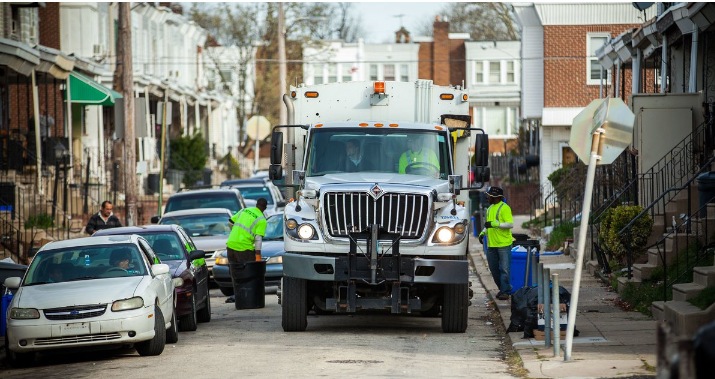
(Phillyvoice.com)
While it does not outline specific climate goals, Mayor Parker’s “Clean and Green” plan presents a concerted approach to addressing environmental challenges and quality-of-life issues in Philadelphia. Parker’s emphasis on collaboration, equity, and sustainability signals a commitment to advance some environmental goals during her tenure as mayor.
Mayor Parker’s Predecessor
While also not frequently considered the “climate candidate”, During his tenure as Mayor of Philadelphia, Mayor Parker’s Predecessor, Jim Kenney, passed several environmental initiatives that aimed to combat climate change and promote sustainability. In his first term, he introduced the Municipal Energy Master Plan, which set ambitious goals for the city, including a 50% reduction in emissions from city-owned buildings, a 20% decrease in overall energy use, and a transition to 100% renewable electricity by 2030. Furthermore, Mayor Kenney’s administration prioritized the implementation of the Climate Action Playbook in 2021. The plan outlined detailed strategies and action items to achieve net-zero carbon emissions by 2050. Under his guidance, the city worked towards engaging various stakeholders and fostering collaboration to ensure the successful implementation of these initiatives.
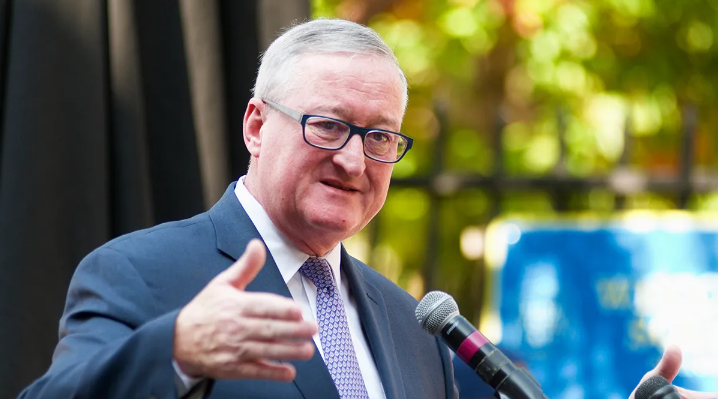
(NBC Ten Philadelphia)
Despite Mayor Kenney’s goals and initiatives, Philadelphia has faced challenges and setbacks in fully implementing some aspects of the plan. Transitioning the city to 100% renewable electricity by 2030, for example, has encountered delays and obstacles, with renewable energy sources still trailing behind nuclear and natural gas in the region’s electric grid. Efforts to reduce emissions from private buildings and increase tree canopy coverage have faced difficulties, including funding constraints and logistical hurdles. While she expressed support during her time as a member of Philadelphia City Council, Mayor Parker has made few commitments to expanding Mayor Kenney’s programs to reach carbon neutrality, though she has committed to working with district council members and the Philadelphia Gas Commission to ensure the city remains on track for its current carbon emissions goals while keeping energy prices affordable. While progress has been made in certain areas, such as reducing emissions from city-owned buildings, Philadelphia continues to grapple with the complexities of achieving its climate targets and addressing environmental issues, highlighting the need for continued commitment and innovative solutions in the years ahead from Mayor Parker, her successors, and Philadelphia City Council.
Mayor Parker’s Path
In recent discussions surrounding Philadelphia’s commitment to achieving carbon neutrality by 2050, newly elected Mayor Cherelle Parker has faced questions regarding the city’s climate actions. At-large City Councilmembers Isaiah Thomas and Rue Landau have proposed a resolution to assess the city’s progress toward its climate goals and explore avenues for accelerating greenhouse gas emissions reductions and called for action from Mayor Parker. The resolution underscores the urgency of addressing climate change, particularly its impact on vulnerable communities, and emphasizes the need for a just energy transition.
To provide a glimpse into alternate visions for the city’s climate policy, we can look to the Democratic primary race for Philadelphia’s mayorship. Candidate Rebecca Rhynhart came second in the race to Parker and set a goal of reaching 100% clean energy and net-zero carbon emissions by 2050 or sooner. She planned to accelerate the transition of the city’s vehicle fleet to zero-emission vehicles, build electric vehicle chargers with federal infrastructure funds, and implement a citizen complaint program to address illegal idling. While not supporting an immediate ban on natural gas in new buildings, Rhynhart emphasized a “just transition” for PGW workers and residents, focusing on sustainable energy strategies over time to minimize negative impacts. Candidate Helen Gym finished third in the race, and expressed a similar commitment to Mayor Kenney’s goal of achieving net-zero carbon emissions in Philadelphia by 2050. She advocated for banning natural gas in new buildings, transforming the Philadelphia Gas Works (PGW) into a “100% renewable energy utility” by 2027, and modernizing every Philadelphia school to eliminate carbon emissions. Gym also proposed incentivizing rooftop solar, improving pedestrian and bike safety, and extending support programs for low-income residents to adapt to climate change.
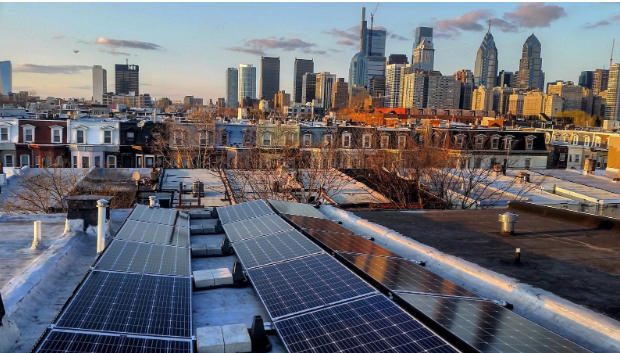
(WHYY)
In assessing Mayor Cherelle Parker’s approach to climate goals, it’s clear that while her administration prioritizes various issues like community safety and education, environmental sustainability is an aspect of her agenda. Her goals may not mirror the climate-centric priorities of her predecessors or primary election opponents, but Mayor Parker’s dedication to advancing equitable sustainability practices positions her as a leader capable of guiding Philadelphia towards a cleaner, greener future; not only in municipal services, but in climate action as well. Challenges like adapting to the “Philadelphia climate cost crisis” laid out in the Center for Climate Integrity’s latest report, expanding Philadelphia’s carbon emissions goals, and preparing PGW for a carbon-neutral future will require attention during Parker’s tenure. Though climate is not the first item on her agenda, her emphasis on a clean and green Philadelphia and her commitment to equity offer a path towards building a more sustainable and resilient city. If she can place these principles of her campaign at the forefront, Mayor Parker has the opportunity to navigate the challenges that lie ahead and propel Philadelphia towards achieving its climate targets, while effectively addressing pressing environmental and “cleaning and greening” concerns.